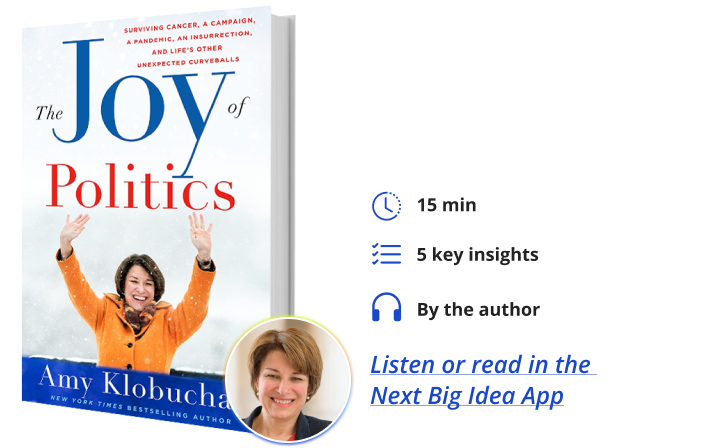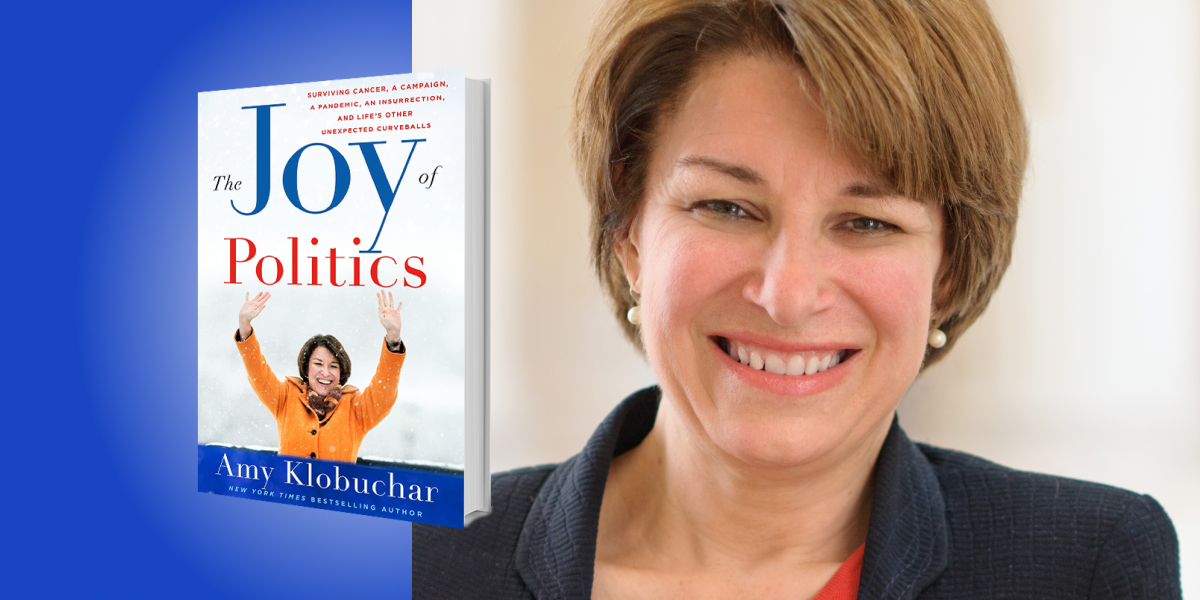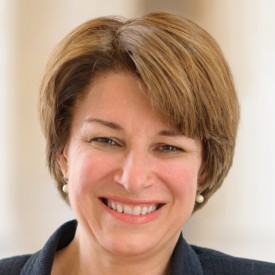Amy Klobuchar is a politician and lawyer serving as the senior U.S. Senator from Minnesota, a seat she has held since 2007. She is the first woman Senator from Minnesota. She also ran as a Democratic candidate for president in 2020.
Below, Amy shares 5 key insights from her new book, The Joy of Politics: Surviving Cancer, a Campaign, a Pandemic, an Insurrection, and Life’s Other Unexpected Curveballs. Listen to the audio version—read by Amy herself—in the Next Big Idea App.

1. There is joy in doing good.
You always start where you are: not where you thought you would be or where you want to be, but where you are. There is no sugarcoating it, though; there certainly isn’t a lot of joy when you find out you have breast cancer, and there’s certainly no joy in the surgeries and radiations aftermath. There’s also not a lot of joy with the hot flashes and various other medical challenges that come with that diagnosis.
But yes, there were the devoted doctors and nurses and my friends and family who were there with me every step of the way. There was a gratitude and lessons learned that you should never take anything or anyone for granted. Most of the joy in that time of healing, though, came from knowing that by making the diagnosis public, I could help others.
I had never spoken to or met Melissa of Maple Grove, Minnesota. She sent me an unsolicited letter about how the public disclosure of my diagnosis of breast cancer had motivated her to go in for a long-delayed cancer test. In the brief letter, she explained that she found out she had stage two breast cancer and was in the course of getting treatment. When I called her to check in months later, I had no idea what the outcome of her treatment was. During that phone call, she was in the waiting room of a suburban breast cancer clinic where she was calmly awaiting her first mammogram checkup after her cancer surgery and treatment. While I still have never met Melissa in person, I pictured her that day in her clinical gown tied in the back, in the clinic-provided slippers, with a cup of coffee in her hand. Both Melissa and I decided that the timing of my call was a positive sign. I asked her to call me back with the results. A few days later, she did. She was 100 percent good. I thought to myself, “OK, God, I get it, and you don’t have to make it so obvious. I did something good.” That’s the joy of doing good.
2. Being a political spouse is not an easy job.
In 2020, way before there was a vaccine, my husband got really sick with COVID. He ended up in the hospital. He had pneumonia and his oxygen saturation levels fell below 70 percent. After six days in the hospital hooked up to oxygen, and another few weeks of a lonely quarantine, he was fine, save for one long-haul symptom: after suffering through COVID, he claimed that the dust in our basement prevented him from ever cleaning out the basement ever again.
In truth, John’s illness put a lot of things in perspective. My husband had done everything and anything for me throughout my career in politics. From the beginning, in 1998, when he meticulously typed in and individually verified permission for 1,000 supporters for my county attorney campaign, to the 2020 presidential run, when he traversed the country in an “Amy for America” t-shirt. From parades in Minnesota to church parking lots in South Carolina to casino basements in Nevada, he was always there for me.
“A political spouse packs school lunches, does the daycare pickups, and gives up jobs and proximity to family and friends to move across the country.”
You get way too used to that in my profession: the spouse sacrificing his or her own ambitions, time, and life for you. Your spouse encourages you to run in the first place, patiently waiting through your political slights of the day and bending at the knees in the family Christmas card photos so you don’t look too short. A political spouse steps in when you are cornered by a long-winded political science professor and, with a hand on the guy’s back, you say, “Have you met my husband?” or “Have you met my wife?” A political spouse packs school lunches, does the daycare pickups, and gives up jobs and proximity to family and friends to move across the country.
Being a congressional political spouse is often a really raw deal. That joke about the dust diversion and John not wanting to clean the basement is actually exhibit A. This story is 100 percent true. Though he was entirely serious when telling me this, I laughed because I knew how much he hated hauling stuff out of there. In most marriages, this anecdote would be a funny story to share at the Thanksgiving dinner table that gets exaggerated over time. For the political spouse, however, it ends up as a story during a cocktail party fundraiser, a speech, or worse yet, on TV. At the end of the day, just because he smiles and laughs along with everyone else doesn’t mean he likes that you brought it up. No matter how well-meaning, the story is out there, and you told it, so what’s he supposed to do?
Twenty years into my life in politics, during a late night over beers at my husband’s high school class reunion, a woman I had never met before came up to me. She said, “You know, it’s so funny. It was always John who we thought would run for office. That’s what we predicted. I guess in a way, he ended up doing it anyway.” At the time, I wanted to say, “Actually, it isn’t that funny.” We did run for office in the end, but it was all about me. It was always me on the debate stage. It was always my name on the campaign sign. It was always my name on the ballot.
3. How to make friends in politics, or frenemies.
In the crowded field that was the Democratic 2020 Primary, I spent an amazing year crisscrossing the country, taking part in multiple nationally televised debates and sparring with my opponents, most of whom ended up as friends. But a lot happened along the way. Of course, there were the debates, parades, forums and town hall meetings. Bernie, Pete and I did two on Fox, and CNN made a ritual out of individual candidate Town Halls, often the night before the debates.
Then there was a time at the Los Angeles PBS Politico Debate when I quickly realized that the pen they had given me to write things down at the podium didn’t work. In fact, it exploded ink on my paper, putting me at an obvious competitive disadvantage. Meanwhile, my opponents were madly scribbling down their talking points.
This pre-debate podium time is always critical, as candidates are allowed to crazily write down their thoughts in three to five minutes before the debate goes live. That way they don’t miss a key point, stat, or joke. It was a stark disadvantage to have no working pen and the debate rules forbade you from bringing out your own. Going backstage for a pen would have lost me precious minutes. What was the solution?
“This pre-debate podium time is always critical, as candidates are allowed to crazily write down their thoughts in three to five minutes before the debate goes live.”
First, Bernie, who was standing to my right, noticed and handed me his officially supplied pen and used his own instead. That’s when I learned that most of the men were surreptitiously tucking a spare pen in their suit jacket inner pockets just in case the debate-supplied pens didn’t work. Then when the pen Bernie gave me also didn’t work, Tom Steyer on the podium to the left of me took out his stash pen and gave me my third official pen. The third time was a charm. Now, years later, I would like to thank those two guys for sneaking in the pens, as it was one of my best debates of this season.
4. The union shall go on; how we saved our democracy.
After the insurrection was over, and the police officers had cleared the Senate Chamber, it was 3:30 AM and there were only two Senators left. Roy Blunt and I still had a job to do. With the young people carrying the mahogany boxes of ballots, along with Vice President Pence, we walked past the statues of George Washington, Abraham Lincoln, Thomas Jefferson, and Rosa Parks. That route was the exact same one the three of us had taken only 13 hours before.
The first time, in a long procession of our colleagues, there had been a sense of ceremony and celebration. This time, it was just the three of us. No other senators were there. There was only silence. Glass was broken, windows were taped up, offices were in shambles, but we walked. Sometimes when you do things in Congress, you realize later that they are really big deals, but you get caught up in the moment and it doesn’t feel like it at the time. This time, it felt like it. We knew what that walk meant.
At the end, Senator Blunt, House Leader Zoe Lofgren, Representative Rodney Davis, and I signed multiple copies of the certified votes from the rostrum. All the votes were in. Vice President Pence and I announced the final vote.
“Glass was broken, windows were taped up, offices were in shambles, but we walked.”
At 4 AM, Roy and I then walked back to the Senate. We stopped on the first floor to see all the damage that had been done to the individual offices, including the parliamentarians. I remember seeing one of the personal family photos of a beloved parliamentarian staff member strewn and seemingly broken on the floor. I wanted to pick it up and put it back so she wouldn’t see it like this in the morning, but I knew that everything should be preserved as evidence for the investigation. The offices looked like crime scenes. In fact, they were.
As we left the torn-up office, I gave Roy Blunt a hug. “See you tomorrow,” he said with his typical understatement. Daybreak was approaching. There was one thing I knew for sure as I left Roy in the corridor. I would see him tomorrow and when tomorrow came, our democracy would still be there.
5. America might be the greatest song the world has yet to hear.
In March of 2022, I attended the annual Fulbright Prize dinner in Washington, DC. It was a memorable evening because it was one of the first big, in-person gatherings in Washington since the beginning of the pandemic. We were all dressed up and finally had a place to go. The honoree was Bono, the celebrity rockstar who never rests on his laurels. Instead, he uses his time and clout to do the hard work of persuading people in power to invest in curing diseases and repairing the world.
By the time I left, my friend Senator Mark Warner took me aside and said, “I think we just heard the best speech ever.” Bono’s theme? America might be the best song the world has yet to hear. His point? Our song is just not done yet. Actually, none of our songs are done yet.
I believe that it is on all of us as citizens, as elected officials, and as people who simply want to pass on a better world to our kids and grandkids, to look for the good and do it. We must. As the inaugural poet Amanda Gorman reminded us when she read her poem in that bright yellow coat, under that perfect blue sky of the 2021 inauguration, “We must find light in this never-ending shade.” That means being honest about not just our country’s shortcomings, but also our strengths. Generations of our fellow Americans gave us their all, adding up to, in Bono’s words at the Fulbright speech, “Two-hundred, forty-six years of inching and crawling towards freedom, sometimes on your belly, sometimes on your knees, sometimes marching, sometimes striding to uphold the ideal of democracy.”
It is on all of us to continue that march. We need to take the long strides, and yes, the inching and crawling to uphold the ideal of democracy. So that’s how I go forward, with a deep love of our country and the realization that our work is never done. Not everything turns out as we want, but there are still many paths ahead. Most of all though, I go forward with joy, with a spring in my step to a tune that’s not yet finished.
To listen to the audio version read by author Amy Klobuchar, download the Next Big Idea App today:
































